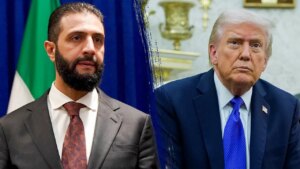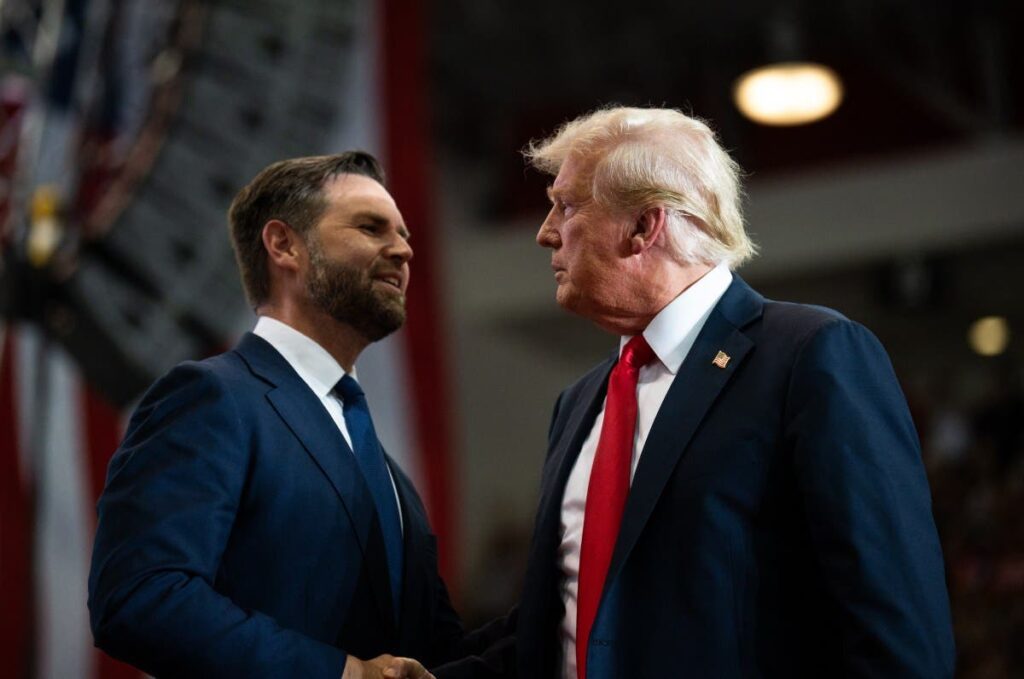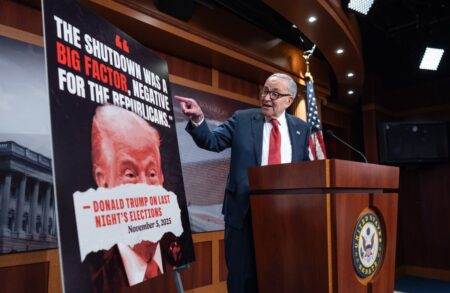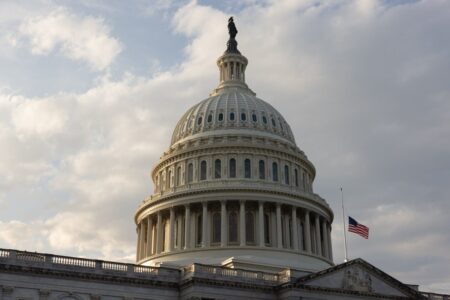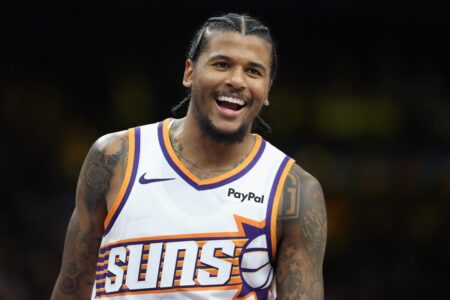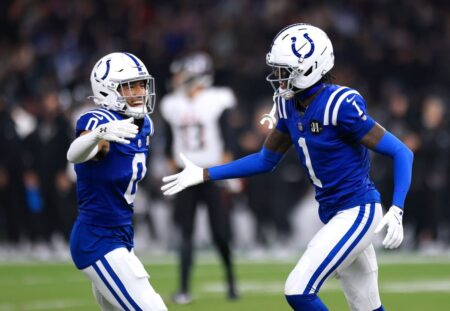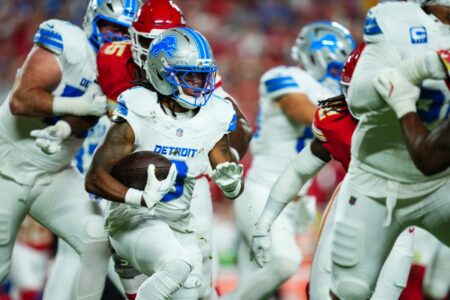After Donald Trump won the 2024 election, JD Vance and his close advisers came up with a guiding principle for his vice presidency and new, unofficial role as heir apparent to the Make America Great Again movement.
There would be no specific policy portfolio, according to three people with knowledge of the informal strategy sessions that took place during the transition, details of which have not previously been reported.
Kamala Harris’ tenure as vice president was viewed by Vance’s team as a cautionary tale. Joe Biden had tasked Harris with tackling the “root causes” of migration to the United States, among other goals, and the immigration assignment in particular backfired. Republicans dubbed Harris the “border czar” and Trump used the fight over immigration during the Biden years to attack Harris on the campaign trail.
Vance did not want to be “the Kamala Harris VP, where you have this portfolio of things. That was [seen as] pigeonholing him,” said a person familiar with Vance’s thinking.
Instead, Vance entered office determined to serve as a political Swiss army knife and stalwart defender of Trump’s agenda, all while keeping the focus on a possible 2028 White House run at bay for as long as possible.
Nine months into Trump’s second term, the strategy appears to be working. Vance has emerged as one of the president’s fiercest supporters on television and social media; an influential voice on domestic policy inside the administration; and a trusted messenger of Trump’s America First vision abroad.
When praising Vance to allies in private Trump is fond of referencing a quote about putting the best athletes on the field, which he attributes to the legendary football coach Vince Lombardi. “JD is an athlete,” Trump has said on several occasions since returning to power, according to two sources who’ve heard the comment firsthand.
“The skill that’s most prized by the president is the ability to go out and defend and advocate for him and his agenda. Nobody has shown more dexterity in going into the toughest venues than JD,” said a Vance confidant. Whether it’s “sending him out on TV, to a debate, to a foreign country, with JD you don’t have to worry about, ‘Is it going to go well?’ He’s just good. He’s talented, and Trump trusts him.”
The president and vice president “definitely trust each other,” White House Chief of Staff Susie Wiles told Newsweek in an interview. “They definitely have a friendship, and have a common view of most if not everything.”
Vance’s ascension to the vice presidency represents the culmination of an unusual decade-long transformation from best-selling author and vocal Trump critic into the leading candidate to take over the Republican Party once the president leaves office. Now, Vance will find out if his all-in bet on Trump can elevate him to the presidency or torpedo his political career.
This account is based on interviews with 13 current and former White House advisers and other people in Vance’s inner circle, Republicans in Congress, former Trump campaign officials, GOP donors and other party operatives. Many spoke on the condition of anonymity to describe private conversations with the vice president.
Republicans in Washington are already buzzing about a likely Vance presidential run in 2028, even though the election is still three years away.
“There are a lot of us around here that are focused on JD being the next president,” Sen. Jim Banks of Indiana told Newsweek in a recent interview in his office.
There is also growing support in private among Vance allies for him to pick Secretary of State Marco Rubio as his running mate — chatter that spilled out into the open when Trump recently called a potential Vance-Rubio ticket “unstoppable.”
The mounting interest in Vance’s White House aspirations highlights the predicament he faces as Republicans begin, however quietly, to consider the GOP’s future post-Trump. This is the first time the country has had a 41-year-old vice president serving alongside a 79-year-old president who routinely deflects attention from his lame-duck status by signaling his interest in serving an unconstitutional third term in office.
Vance’s unconditional embrace of Trump and his second-term record is also a double-edged sword, many Republicans acknowledge in private. They concede it will turn off most Democrats and some independent voters. And while his unwavering loyalty to Trump may secure the 2028 Republican presidential nomination, it’s an open question if Vance can turn out MAGA voters — and carry Trumpism forward — without Trump on the ballot. That concern was reinforced in elections this month that saw Republicans lose several high-profile races.
“This is a very different situation than we’ve been in in modern times,” said Robert Blizzard, a top Republican pollster. “For the time being Vance is in a very, very good position. But at some point, it’s going to get very complicated.”
A former Trump campaign official was more blunt.
“It feels like he’s locking up the nomination today. It is the right strategy, but it does put him in a difficult spot in a general election because it won’t allow Vance to be his own man,” the person said. In 2028, “if Trump is popular, which for him is mid-40s [approval rating], and the economy is strong, then Vance is in great shape,” the source added.
“But if people say no more, like they did when he lost in 2020, Vance is screwed.”
‘In the room for everything’
As a vice president without a formal policy portfolio, Vance has worked on an eclectic array of issues that defy easy categorization. The approach has allowed Vance to champion the Trump administration without getting tied to any single policy that could come back to haunt him in the future.
“Vice presidents in the modern era have often taken on a portfolio. The problem and the challenge with having a portfolio is that it can constrain you,” said Herbie Ziskend, a former adviser to both Biden and Harris when each served as vice president.
“If your portfolio is small business and the news of the day is a war in Iran, and you have a meeting with a bunch of small businesses, you’re not where the action is,” added Ziskend, who also served as the Biden White House’s deputy communications director. Vance has “made the calculation that it’s better to be out there ubiquitously defending Trump and whatever the issue of the day is, rather than being [constrained by] a portfolio.”
Vance, who worked as a venture capitalist in Silicon Valley before winning his U.S. senate seat in Ohio, was instrumental behind the scenes in helping negotiate an agreement that transferred ownership of the social media giant TikTok from China to American investors. Trump cited Vance’s tech expertise in tapping him to be part of the negotiations, three sources familiar with the matter said.
The vice president played a role in securing Republican support for the One Big Beautiful Bill Act, Trump’s centerpiece domestic legislation cutting taxes and spending. (Vance also cast the tie-breaking vote for the bill, which was signed into law in July.)
Vance has been dispatched around the country to promote Trump’s economic policies, and to the U.S.-Mexico border to highlight the administration’s immigration crackdown.
In October, Vance traveled to Israel to push the Israeli government and Hamas to uphold their fragile ceasefire deal. Earlier this year, Vance delivered a searing rebuke to European allies over issues of free speech and immigration at the Munich Security Conference in Germany.
The speech in Munich underscored his ability to channel the president’s anti-globalist rhetoric. But it also reflected Vance’s own worldview and experience growing up in the Rust Belt and serving in the Iraq War, according to people who have known and worked with him for years.
“He represents that post-9/11 generation that loves our country but knows that we had weak leadership from both parties, Republican and Democrat, who mismanaged wars, mismanaged our country,” Banks said.
“It’s a totally different flavor from the old-school Republican Party,” said Banks, a 46-year-old first-term senator who served in Afghanistan. Vance is “the most articulate Republican today who can explain America First.”
In Washington, Vance regularly appears at Trump’s side for meetings with other world leaders. Vance typically takes a back seat and plays the part of the president’s dutiful No. 2, though in one instance he found himself in the spotlight after engaging in a rare Oval Office shouting match with Ukrainian President Volodymyr Zelensky.
Vance is part of a small circle of senior administration officials who Trump turns to for advice on major decisions, according to several sources with knowledge of the inner workings of the West Wing. In addition to Vance, the group includes Wiles and Rubio, Stephen Miller, the White House deputy chief of staff for policy, and James Blair, the deputy chief of staff for legislative affairs.
“JD’s in the room for everything,” another Vance ally said.
Behind closed doors Vance rarely disagrees with Trump, according to two people who asked not to be named to share details of the internal decision-making process at the White House.
Publicly, Vance has also backed Trump’s second-term initiatives, including controversial tariffs that sparked a trade war with China and other countries, the mass deportation of undocumented immigrants, the deployment of National Guard troops to major U.S. cities, and the prosecution of the president’s perceived political enemies.
The vice president’s office declined to comment on the record for this story.
Another White House source close to Vance said that his strong relationship with Trump was based on aligned policy goals and a team that was fully integrated with the president’s staff.
Vance and Trump’s teams work closely together, according to multiple sources with knowledge of the dynamic. Wiles and Vance’s chief of staff, Jacob Reses, speak daily and attend a regular staff meeting together. Vance himself has developed a good relationship with Wiles and is close with Miller.
In many cases, the relationships predate last year’s campaign. Vance courted Donald Trump Jr. and other figures in the president’s inner circle in the lead-up to his 2022 Senate race in Ohio. The effort paid off in the form of a Trump endorsement, which gave Vance — who had fallen behind in the polls in a crowded primary field — the boost he needed to win his Senate seat. Vance later returned the favor by endorsing Trump’s reelection bid early on, at a time when Trump faced mounting legal problems and uncertainty over his political comeback.
White House press secrtary Karoline Leavitt said that Trump seeks Vance’s input on a wide range of issues.
“President Trump has an incredible relationship with Vice President Vance, who he has trusted to represent our country everywhere from manufacturing plants in Wisconsin to the Civilian-Military Coordination Center in Israel. The President takes the Vice President’s counsel frequently on a variety of policy matters, and he has been the perfect complement to the Commander-in-Chief,” Leavitt told Newsweek in a statement.
The unlikely Trump-Vance partnership has become something of a political Rorschach test. To supporters on the right, Vance’s loyalty to Trump is viewed as a testament to his character and an emblem of his shrewd political instincts.
On the left, critics see Vance as the Machiavellian defender-in-chief of a dangerous president who is using his second term to undermine democracy and the rule of law.
“Vance is an intelligent guy and presents himself well. In the [2024 vice-presidential] debate he clearly got the best of Tim Walz,” said David Pepper, a former chairman of the Ohio Democratic Party.
Nevertheless, “there are few people I’ve ever witnessed in politics who are more frustrating and disturbing to watch,” Pepper said. Vance is “clearly someone who will say and do whatever he needs to do to get ahead. At this point, getting ahead means [defending] whatever terrible thing Trump has just done. And he has no shame in doing it.”
The strong ties between Trump and Vance’s teams and relative lack of drama in the White House stand in marked contrast to the in-fighting that consumed Trump’s first term with then-Vice President Mike Pence.
Pence angered top Trump aides when he signaled his interest in eventually running for president by taking the unprecedented step of launching his own political action committee in early 2017, only four months after taking office. Trump’s team also viewed Pence’s senior staff with suspicion, and believed the vice president’s office was responsible for leaking stories suggesting that Pence disagreed with Trump on foreign policy, among other issues, several sources said.
For their part, Trump and Pence — a conservative former Indiana governor who was popular with the Evangelical Christian right — never developed a close personal bond during their time in the White House. The relationship fell apart when Pence refused to bow to pressure from Trump to block Congress from certifying Biden’s 2020 election victory and a mob of Trump supporters attacked the U.S. Capitol on Jan. 6, 2021.
A spokesperson for Vance declined to comment for this story.
Even before Jan. 6, Pence didn’t have “the rapport the president enjoys with Vice President Vance today,” said another source with deep ties to the White House.
A Republican strategist who has worked with Trump in the past said the fallout should serve as a warning to Vance.
“Mike Pence was a supplicant for all but the last month of Trump’s first term, and he’s now a pariah among Republicans,” said the source. “Ninety-nine percent loyalty is insufficient to Trump.”
A digital native VP
The Vance team’s aggressive digital media operation also represents a break from the model followed by Pence and everyone else who’s served as vice president in the years since online fundraising and social media transformed the political landscape.
Vance is the third youngest U.S. vice president in history, and the only major party presidential or vice-presidential nominee in the 21st century who was born in the 1980s or later. Though he falls into the category of an older millennial, Vance is the closest thing yet to a digital native in one of the top two positions in American government.
In the White House, Vance has surrounded himself with a coterie of younger press aides who help execute a media strategy that’s aimed at rallying the conservative base around Trump.
“JD’s brand is that he’s President Trump’s absolute attack dog,” Republican Sen. Bernie Moreno of Ohio said in an interview.
Vance is a prominent voice in the rightwing media ecosystem, where he amplifies Trump’s message to MAGA supporters. The vice president often spars with critics on X. He hosted The Charlie Kirk Show after the conservative activist was assassinated in September, and has appeared on numerous other podcasts, including Pod Force One, the Ruthless Podcast and The Katie Miller Podcast.
(Miller, who is married to Trump’s policy chief at the White House, asked Vance on her show which three people living or dead he would invite over to dinner. Vance named Isaac Newton, Trump and Abraham Lincoln. “Who’s monopolizing the conversation?” Miller followed up. “I’m not going to answer that,” Vance said with a laugh).
Vance also appears frequently on mainstream broadcast television networks. The interviews are tracked by Trump, who has long been known to keep a close eye on his aides when they defend him on TV.
“He watches everybody, it’s not just JD,” said Wiles, the White House chief of staff. “But he’s very happy whenever he sees JD on television.”
Yet even those interviews aren’t geared toward winning over the audiences — which skew older and more moderate — who still watch live TV news, according to several sources who described Vance’s communications strategy.
Vance’s interview last month with ABC’s “This Week” host George Stephanopoulos underscored the approach. Stephanopoulos cut the interview off after telling Vance that he refused to answer a question about a 2024 FBI investigation into Tom Homan, the current White House border czar. Democrats ridiculed Vance’s performance. But it went viral on social media and won widespread praise from conservatives.
“The 1 million people who are watching a Sunday show are not the constituency he’s seeking to win over,” said one longtime Republican operative who has known Vance for years. “It’s the 40 million who consume a clip from that interview online through many different mediums, who see him putting up a fight against Democratic talking points and the media they’ve grown to distrust. It’s brilliant.”
The person added: “One of Trump’s great revelations was [understanding] the theater of politics. I think JD has picked that up and run with it to the next generation, a digital generation.”
Vance displayed his grasp of Internet culture on Halloween, when he appeared to poke fun at himself by posting a picture and video on social media showing him dressed as an unflattering Vance meme known as “fat JD.” The costume was applauded by supporters who said it showed the lighter side of a vice president who does not take himself too seriously.
But Vance’s willingness to wage battles online has also stirred up controversy at times.
In an appearance on The Charlie Kirk Show in October, Vance dismissed a news report that revealed a trove of racist and antisemitic text messages between young Republican staffers, downplaying the group chats as “edgy, offensive jokes.”
Vance also defended an AI deepfake video Trump posted on Truth Social in late September that depicted House Minority Leader Hakeem Jeffries, who is Black, wearing a sombrero and false mustache as mariachi music played.
Jeffries called the video racist. Vance told reporters at a White House press briefing that he thought the video was “funny.”
“The president’s joking, and we’re having a good time,” Vance said.
‘A true believer’
Last year, when he was being vetted to be Trump’s running mate, Vance voiced concerns about the impact that serving as vice president would have on his young family, according to two sources familiar with the matter. Vance and his wife, second lady Usha Vance, have three children under the age of 10.
But Vance has stopped mentioning the issue since taking office, the sources said. In Vance’s orbit it’s expected that he will run for president in 2028. But several sources cautioned that it’s still far too early to speculate about things like voter outreach, battleground state strategy and other details surrounding a hypothetical Vance campaign.
At political events Vance is often approached by donors asking how they can help him run for president. He quickly shuts down the 2028 talk and urges supporters to help Republicans hold the House and Senate in next year’s midterm elections, according to sources who have witnessed the conversations on multiple occasions.
“This is not a point of conversation on a regular basis,” one ally who speaks frequently with Vance said of the 2028 race. “It’s not like there’s a constant strategizing about JD becoming president, even though everyone thinks that’s where we’re headed.”
Still, as time goes on it will become increasingly harder for Vance to sidestep the 2028 speculation.
If he chooses to run, Vance can likely afford to wait longer than usual before making an official announcement, thanks to his standing in the party and likely backing from Trump. Two sources in Vance’s orbit said they don’t expect that the vice president would clear the primary field, and think it’s more realistic that he would have to fend off other challengers.
“Right now, it’s an open field,” said John Catsimatidis, a Republican billionaire donor who backed Vance’s Senate campaign. “I’m sure there’s other people who want that job too.”
Vance would start out with significant built-in advantages. Much like an incumbent president running for reelection, Vance could use his bully pulpit to command attention on the campaign trail.
He would enter the race as a seasoned campaigner and debater with one successful national election on his resume. Vance could tap into his coalition of supporters from Congress to Silicon Valley and outside conservative groups with ties to the tech sector like the Rockbridge Network, in addition to Trump’s vast fundraising operation.
He would have his pick of GOP stars to serve as his vice presidential nominee, though the prospect of a Vance-Rubio ticket has so far generated the most enthusiasm in Republican circles.
Vance and Rubio have formed a genuine friendship, said one source close to the vice president who downplayed the notion that the two men are rivals.
“He and Marco are actually friends. There isn’t this subtext of tension,” the source said.
A State Department spokesperson said in response to a request for comment that Rubio and Vance enjoy a strong personal and professional relationship.
“Vice President Vance and Secretary Rubio have an incredible relationship, both personally and professionally. The Secretary is honored to be part of Trump’s administration and fight for American workers, strong families, and putting America first,” Tommy Pigott, the principal deputy spokesperson for the State Department, said in a statement to Newsweek.
But outside of Vance World, some diehard MAGA supporters remain wary of the vice president.
Even if Vance received Trump’s endorsement, Republicans who spoke to Newsweek voiced doubts that Vance could win over Trump voters who’ve never gotten over his past criticisms of the president.
During the 2016 presidential campaign, Vance was a self-described “Never Trump guy” who publicly criticized Trump and wondered in a private message if Trump could be “America’s Hitler.” Vance said later that he was wrong and came to support Trump after he took office.
“Vance called Trump Hitler and said he was a terrible person,” said another former Trump campaign official. “That was just a bridge too far. That wasn’t an assessment of style. I just don’t know that you can change your mind on something like that.”
Pepper, the former Ohio Democratic Party chairman, said that nine years after Vance burst onto the national scene with the publication of his memoir, Hillbilly Elegy, “I don’t know who the real JD Vance is.”
“Is it that guy [who once criticized Trump], or the figure who now apologizes for every Trump law violation, goes to bat for Homan, makes up stories about Haitian immigrants, and thinks the sombrero meme is funny?” Pepper said. “That’s a person you can trust the least. I don’t want that person anywhere near power.”
Still, Democrats said Vance could be a formidable 2028 opponent.
“Whenever a vice president runs for president, the judgment of that individual is going to be [based on] the success or failure of the president. Vance intuitively understands that,” said Ziskend, the former Biden administration official.
Vance allies said his onetime reservations about Trump will be a distant memory for most voters by the time the next election rolls around. After serving alongside Trump for four years, Vance’s MAGA credentials will be unimpeachable, they said.
“JD is a true believer,” said Moreno, the Ohio Republican.
Vance is aware that his fate is tied to Trump, one close adviser said.
“The more committed and devoted to Trump’s agenda JD is, the greater opportunity he has to succeed him in the end, and I think he’s cognizant of that,” the person said. “He’s focused on being the best advocate for Trump. He’s betting that if he does that, the rest will work out.”
Read the full article here


